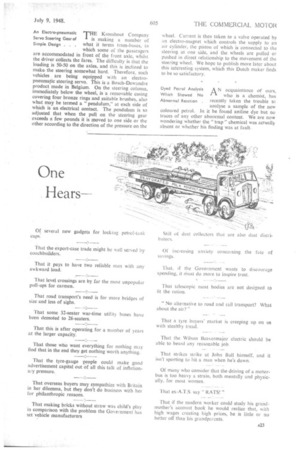One
Page 25

If you've noticed an error in this article please click here to report it so we can fix it.
Hears—
Of sevcral new gadgets for locking petrol-tank caps.
That the export-case trade might be well served by coachbuilders.
That it pays to have two reliable men with any awkward load.
That level crossings are by far the most unpopular pull-ups for carmen.
That road transport's need is for more bridges of size and less of sighs.
That some 32-seater war-time utility buses have been demoted to 28-seaters.
That this is after operating for a number of years at the larger capacity.
That those who want everything for nothing may find that in the end they get nothing worth anything.
That the tyre-gauge people could make good advertisement capital out of all this talk of inflationary pressure.
That overseas buyers may sympathize with Britain in her dilemma, but they don't do business with her for philanthropic reasons.
That making bricks without straw was child's play in comparison with the problem the Government has set vehicle manufacturers
Still of dust collectors that are also dust distributors.
Of increasing anxiety concerning the fate of savings.
That, if the Government wants to discourage spending, it must do more to inspire trust.
That telescopic meat bodies are not designed to fit the ration.
" No alternative to road and rail transport? What about the air? "
That a tyre buyers' market is creeping up on us with stealthy tread.
That the Wilson Beavermajor electric should be able to beard any reasonable job.
That strikes strike at John Bull himself, and it isn't sporting to hit a man when he's down.
Of many who consider that the driving of a motorbus is too heavy a strain, both mentally and physically, for most women.
That ex-A.T.S. say " RATS!"
That if the modern worker could study his grandmother's account book he would realize that, with high wages creating high prices, he is little or no better oil than his grandparents.




















































































